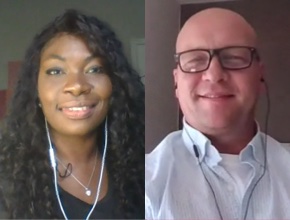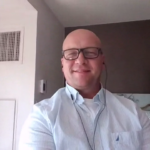Description
Friends Nathan Earl (46) and Shanika Ampah (41) discuss how they each came to the anti-trafficking field, their individual stories of being trafficked, what they hope to see in the ant-trafficking field, and how they would like to pass on the torch to the next generation of leaders. Note: In this interview, Nathan misspoke and indicated he dropped out of high school. Nathan excelled in high school but would later drop out of college during his trafficking experience.Subject Log / Time Code
Nathan (N) describes growing up in a conservative, christian home with seven siblings. He says he was born in Indianapolis before moving to Florida. N explains that he met Shanika (S) at the human trafficking leadership academy.
S says she grew up in a Christian home with two parents. She emphasizes that human trafficking is a local issue in the United States. S and N say that we may miss little girls and boys who experience trafficking if we rely on stereotypes.
N shares that trafficking is an inter generational issue. He shares that eight years ago he was volunteering for a non-profit serving young boys who had experienced sexual assault when he came across the term human trafficking. N says it ignited a passion in him to serve this population of young boys who had been trafficked.
S talks about the importance of language. She recalls when she first heard language describing what she experienced as a child. S emphasizes the importance of using accessible language when speaking about human trafficking. S says she started working for Project GOLD at Kristi House, a non-profit dedicated to eradicating child abuse and child sex trafficking because she wanted to let young women know that they could move beyond their experience of being trafficked.
N talks about the misconceptions of what human trafficking is. He talks about how drugs played a big role in his experience with trafficking and how that behavior was normalized.
S talks about the importance of addressing underlying issues that play a role in human trafficking and says that if the goal is to only eradicate human trafficking then the field will always miss the mark.
N talks discusses ACE (adverse child experiences) and how when compounded they lead to exploitation. N says ACE helps frame the issue of human trafficking as an issue of a pandemic of violence.
S shares that she has looked at what her ACE score would be but also what her children’s score would be because intervention and prevention is key. S says she also encourages other parents to do the same because she believes in the importance of changing cultures.
N shares what his experience of trafficking was like.
S talks about her experience of trafficking. She talks about the image of the ‘runaway girl’ and highlights the important of questioning why the girl ran away.
N says that the turning point for him was when a counselor encouraged him to search for meaning in the difficult and traumatic experiences he had dealt with. He says the biggest challenges after the trafficking was dealing with the psychological damage from the trauma he experienced.
N and S talk about where they see the anti-trafficking field going. N says the trend to see human trafficking as a public health crisis is a great trend. N says where the field needs to improve is the neglect of labour trafficking, people of color who are the majority of victims, and male victims. S says many anti-trafficking organizations have become exploitative. She says if you need to exploit a survivor for their story in order to get a grant, then you are doing the same thing that a pimp does. S says there is also a need for more collaboration and national bills and policies.
N talks more about adopting a wide-spread public health approach. S talks about a two-generation approach.
N talks about how he would like to pass the torch of his work on male-victimization. He says he is working to transition his responsibilities from being on the ground to teaching and training the next generation of leaders in the anti-trafficking field.
S talks about how she would like to pass on the torch. She wants to continue to be resourceful. She loves to serve, be present in the community, and perform outreach. S talks about the importance of thinking beyond the term survivor.
Participants
- Shanika Ampah
- Nathan Earl



